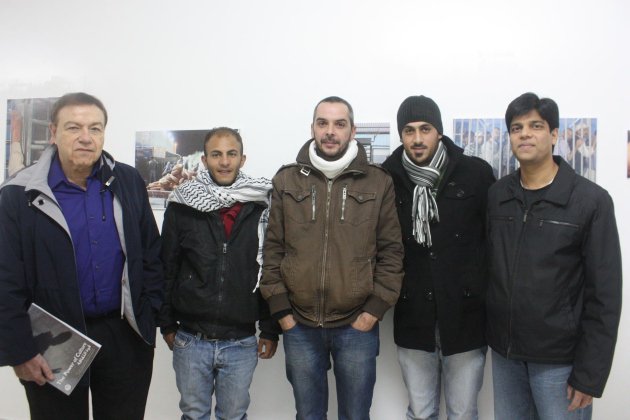While he strolls ancient roads of Jerusalem or Palestine, visits Rachel’s Tomb or spends time at refugee camps, Sanjay Asthana craves peace – and occasionally hummus.
An associate professor in the School of Journalism, Asthana grew up in India, where he was introduced to hard times and suffering at an early age. He lost his father when he was 9 years old and was raised by a single mother and his older sister. His family came from a poor socioeconomic background. He struggled to stay in school, but persevered. He found himself 25 years young in the U.S. with a bachelor’s degree, a master’s degree and a pre-Ph.D. in philosophy.

Pictured in Bethlehem along with Dr. Asthana (right) are (left to right): Nishan Havandjian, co-investigator; Miras Al Azza from the Lajee Youth Media Center in Bethlehem; Rich Wiles, a British volunteer; and Mohamed from Lajee.
It was in the midst of these struggles that he developed many of his ideas – the very ideas that spark an enthusiastic fire in the eyes of the driven professor as he speaks. To say that his adverse upbringing has in some way paid off would be an understatement.
In 2010, Asthana won the Qatar National Research Foundation Grant of roughly $250,000 to continue his dedicated research into youth media in the Middle East.
“This project is about doing this research and getting it done,” Asthana said. There are some fascinating changes happening among youth in the Middle East, the U.S. and South Africa, and Asthana is front and center to document them.
He is interested in what the youth do with low-end social media. “I’m not so much interested in Facebook and Twitter,” he said. How the youth create content is the primary focus. The issues they are talking about in their communities and lives – that’s what he’s looking at.
Issues such as social justice, peace and the challenges of lesbian, gay, bisexual and transgender rights now are being communicated between cultures. “This is a collaboration of ideas,” he said, understanding and acceptance in the making. This could potentially mean peace, and forgiveness may live in places where it’s been absent quite some time, he explained.
He described his work as “heterodox.” He explained that when “drawing ideas and insights from texts and works, I don’t stick with one. I move between different ideas and theories.” This groundbreaking research is “a deep, abiding commitment,” he said.
Former student Jane Horne described Athana as “passionate,” adding, “He’s a great professor.” As a man who began his journey as a Youth Radio broadcaster and a media and cultural studies researcher, Asthana lives up to the hype.
He will conclude his research when the grant ends in 2014. After that, he will write a book on his findings. He plans to publish in 2015 in both English and Arabic.
American philosopher John Dewey said, “Education is a social process. Education is growth. Education is not a preparation for life; education is life itself.” It makes sense that Dewey is a major influence on Asthana, who brings this quote to life. TLE
Public relations major Darcy Threet wrote this feature while a student in Sharon Fitzgerald’s Media Writing class.


Leave a Reply